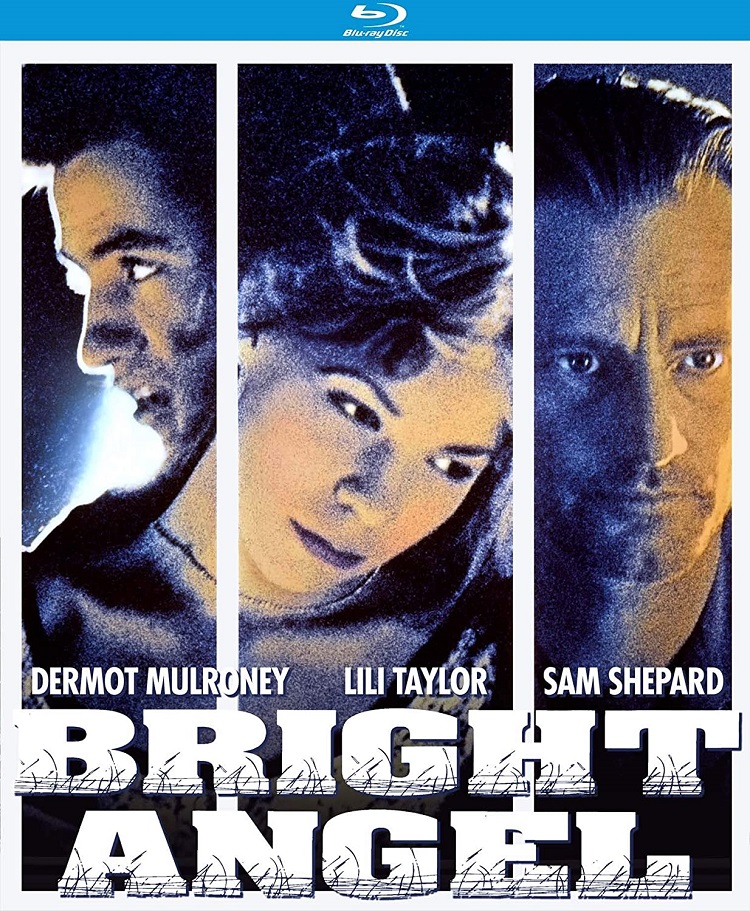
One of the great joys of being a movie nerd in these times is that we have access to so many movies. Whether it be via your streaming service of choice or one of the many excellent boutique Blu-ray labels, movie lovers have more options than ever on which to view their movie of choice. Alongside all the fantastic movies (and more than a few bad ones) are overlooked gems. Movies one might have never heard or watched were it not readily available in various formats. There is nothing like discovering a new favorite movie, especially when it wasn’t even on your radar.
Bright Angel isn’t quite a forgotten classic, but it is an interesting discovery and one I’m glad I watched. It came out in 1990, a year in which I turned 14 so it wouldn’t have really been on my radar back then as it’s a pretty staid drama. Apparently, it wasn’t on anybody radar as it only made $158,243 at the box office, despite a pretty glowing review from Roger Ebert and a stacked cast featuring Sam Shepard, Bill Pulllman, Lili Taylor, Dermont Mulroney, Benjamin Bratt, Burt Young, and Delroy Lindo.
Mulroney stars as George, a boy on the verge of manhood. A teenager unsure of his place. He lives in the wide open spaces of Montana but he feels boxed in. We first find him duck hunting with his father (the always marvelous Sam Shepard). But this is no pleasure outing between father and son for we see them sell the birds to a local restaurant to earn a few extra bucks. When they return home, they find a young man, a soldier from the local base standing in the kitchen. The dad asks about who he is and where his wife is (she’s upstairs and the two have clearly been having sex). He is polite, almost friendly to the boy, but there is a rage behind his eyes. When his wife comes downstairs, out comes his gun. In another movie, things would end violently, but here the boy drives off and the mother packs her bags.
These two men, father and son, try to make a life together. The father makes a meal and gives some advice, but he’s not good at it. Life has been too hard, too disappointing for him to know how to give his son a better one. George loves his father, his mother too, but he’s hoping for something more. When he meets Lucy (Lili Taylor), a young woman drifting through life with a certain charm and beauty, he is mesmerized. When she says is headed off to visit her imprisoned brother a few towns over, he offers her a ride.
They take George’s friend Claude (Benjamin Bratt) with them for awhile, but he’s too rambunctious and restless so they drop him. While she visits her brother, he stops in at his Aunt Judy’s (Mary Kay Place) and visits with her new husband Harley (Delroy Lindo), a veteran who was injured in a racist attack at work and now spends his time playing with his collection of guns, waiting for the men to appear in white hoods. George and Lucy talk and drink and flirt. She teases him with possible sex while he awkwardly deflects and signs up for a boxing match at a local bar. The film is full of little moments. It is a character study and a slide show of life at this place in this time. It is based on some of the stories of Richard Ford and it has a short story feel to it.
Eventually, they meet up with some hard men, guys who are set to testify against the brother to lessen their own time behind bars. Lucy offers them money to leave town and not testify, but all they see is money and opportunity. Violence occurs and George’s life is changed. He grows up in those moments and is then able to move on.
Bright Angel isn’t a great film. It is a coming-of-age, road-trip movie that is a slice of life cut from many different stories. For much of its run time, it is a bit meandering and when it finally gets moving, the action feels out of place. It is an interesting look at interesting characters that never quite delves deep enough into any of their lives to feel completely satisfying. It is a film I’d never heard of until this Blu-ray landed on my doorstep. Discovering a film like this is its own joy and I’m glad I watched it.
Kino Lorber Studio Classics presents it with a 1.85:1 aspect ratio with a 1080p transfer. Extras include an audio commentary by director Michael Fields and a booklet essay by writer Richard Ford.